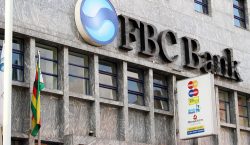

The emergence of Omicron raises the uncertainty around inflation, the chair of the Federal Reserve has warned.
Rising rates of Covid, plus the new variant, pose new risks to the US economy, Jerome Powell told a Congressional committee.
In the past Mr Powell has called recent high rates of inflation transitory, a term he said should now be “retired”.
He also said the Fed should consider tapering its bond-buying stimulus more quickly.
During the course of the pandemic the Federal Reserve has been praised for warding off recession with its asset purchasing programme. This month it began the process of reducing that support, the first step towards increasing the cost of borrowing, the usual policy strategy to tame inflation.
However a debate has arisen over whether the support should be withdrawn more rapidly.
Some economists argue that faster tapering, and an earlier move to higher interest rates, are needed to tackle prices which are rising at their fastest pace for 30 years.
Mr Powell has argued that higher prices are the result of pandemic disruption, including to supply chains, and swings in consumer demand. He predicted inflation would fade as the pandemic eased.
However, the emergence of Omicron has shaken global markets, raising the prospect that restrictions on travel, social and economic activity could be extended further.
“The recent rise in Covid-19 cases and the emergence of the Omicron variant pose downside risks to employment and economic activity and increased uncertainty for inflation,” Mr Powell told the Senate banking committee.
“Greater concerns about the virus could reduce people’s willingness to work in person, which would slow progress in the labour market and intensify supply-chain disruptions,” he added.
When asked about his view of whether inflation could still be described as transitory, Mr Powell said: “It is probably a good time to retire that word, and explain more clearly what we mean.”
He said he believed that high inflation would persist until the middle of next year, and so the central bank is “likely” to discuss speeding up the tapering of its asset-buying programme.
The markets have interpreted the statements as a change of tone from the Federal Reserve chair, indicating a shift towards a tighter monetary policy.
“We’ve long maintained that the Fed is the ultimate owner of the ‘transitory’ characterisation and the chair’s decision to move beyond that is a decidedly hawkish step,” said Ian Lyngen at BMO Capital Markets. – bbc.com
Sorry. No data so far.

